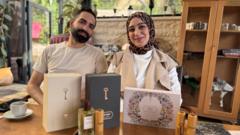This article explores the creation of Mejana perfumes by Qassem Abu Khalaf and Malak Hijazi, emphasizing their connection to Palestinian identity and the challenges faced in launching their brand amidst conflict.
Aromatic Heritage: Palestinian Fragrances Amidst Conflict

Aromatic Heritage: Palestinian Fragrances Amidst Conflict
A Palestinian couple in Jerusalem channels their cultural legacy into a new perfume line, Mejana, reflecting their homeland's history and beauty despite the ongoing turmoil.
In the picturesque landscapes of East Jerusalem, a young couple, Qassem Abu Khalaf and Malak Hijazi, are crafting fragrances that capture the essence of Palestinian heritage. Their newly launched perfume line, Mejana, is designed not just to smell good but to evoke memories and emotions tied to their cultural roots. The old olive groves of the Jordan Valley, where Palestinian women vibrantly sing folk songs, serve as a backdrop to the tales encapsulated in their scents. This initiative represents a longing for moments of joy and community, even in the face of war and displacement.
Qassem, an advanced materials engineer, has spent years experimenting with high-quality ingredients, developing a library of hundreds to perfect his fragrances. Each scent from the Mejana line is carefully crafted, offering a sensory experience that intertwines personal and communal history. "We’re trying to send a message to people through our perfumes, revealing our heritage and the scent of our land," Qassem explains, emphasizing the significance behind their creations.
The couple chose the name "Mejana," signifying traditional songs sung while working, to encapsulate the spirit of happiness associated with the nostalgic memories of their past. “Mejana has a special rhythm when you sing it,” Malak notes, reinforcing their mission to create fragrances that foster joy.
Their first two perfumes, “Zaref Atool” and “Rozana,” embody stories deeply rooted in Palestinian folklore. Zaref Atool reflects the atmosphere of the Old City’s labyrinthine streets, while Rozana tells another poignant tale—a ship expected to bring nourishment during a historical famine that instead symbolizes loss. Both scents serve as a testament to the couple’s commitment to preserving Palestinian identity through their art.
However, the current geopolitical situation has made their debut challenging. The couple launched their brand last September, shortly before escalating violence impacted their community in Jerusalem. With the subsequent decline in tourism, local markets have suffered, yet they have found a receptive audience among the Palestinian diaspora, particularly in Australia. This unwavering resolve has led them to create a second collection of perfumes, beautifully packaged and rich with local symbolism.
The design of their perfume containers, featuring wooden capsules and a key motif, holds significant meaning. The key echoes the narratives of loss connected to displacement, representing the homes Palestinians have been forced to abandon since the 1948 conflict. “When you smell a particular scent, it brings back beautiful memories. So, it is the key to our ancestors and our childhood memories,” Malak explains.
In addition to their passion for perfumery, Qassem and Malak recently welcomed their first child, a daughter named Sadeel. As they navigate the complexities of bringing new life into a world rife with conflict, they foster hope for peace and the healing that comes with it. “It’s not easy… but we hope everything will come to an end and we’ll have peace,” Qassem reflects, hinting at a longed-for future filled with possibility, renewal, and profound connection to their cultural heritage.
Qassem, an advanced materials engineer, has spent years experimenting with high-quality ingredients, developing a library of hundreds to perfect his fragrances. Each scent from the Mejana line is carefully crafted, offering a sensory experience that intertwines personal and communal history. "We’re trying to send a message to people through our perfumes, revealing our heritage and the scent of our land," Qassem explains, emphasizing the significance behind their creations.
The couple chose the name "Mejana," signifying traditional songs sung while working, to encapsulate the spirit of happiness associated with the nostalgic memories of their past. “Mejana has a special rhythm when you sing it,” Malak notes, reinforcing their mission to create fragrances that foster joy.
Their first two perfumes, “Zaref Atool” and “Rozana,” embody stories deeply rooted in Palestinian folklore. Zaref Atool reflects the atmosphere of the Old City’s labyrinthine streets, while Rozana tells another poignant tale—a ship expected to bring nourishment during a historical famine that instead symbolizes loss. Both scents serve as a testament to the couple’s commitment to preserving Palestinian identity through their art.
However, the current geopolitical situation has made their debut challenging. The couple launched their brand last September, shortly before escalating violence impacted their community in Jerusalem. With the subsequent decline in tourism, local markets have suffered, yet they have found a receptive audience among the Palestinian diaspora, particularly in Australia. This unwavering resolve has led them to create a second collection of perfumes, beautifully packaged and rich with local symbolism.
The design of their perfume containers, featuring wooden capsules and a key motif, holds significant meaning. The key echoes the narratives of loss connected to displacement, representing the homes Palestinians have been forced to abandon since the 1948 conflict. “When you smell a particular scent, it brings back beautiful memories. So, it is the key to our ancestors and our childhood memories,” Malak explains.
In addition to their passion for perfumery, Qassem and Malak recently welcomed their first child, a daughter named Sadeel. As they navigate the complexities of bringing new life into a world rife with conflict, they foster hope for peace and the healing that comes with it. “It’s not easy… but we hope everything will come to an end and we’ll have peace,” Qassem reflects, hinting at a longed-for future filled with possibility, renewal, and profound connection to their cultural heritage.



















